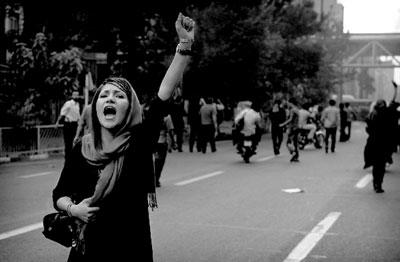Over 30 years of anarchist writing from Ireland listed under hundreds of topics
Iranian Protestors at War with God
 On Monday November 9th last year, news of the impending execution of Ehsan Fattahian, a 28-year-old Iranian political activist of Kurdish origins, began reaching the outside world. Human rights groups, caught unaware, began a frantic effort to halt the execution. In less than 24 hours, 15,000 people had signed an online petition addressing UN secretary general Ban Ki Moon, asking him to intervene.
On Monday November 9th last year, news of the impending execution of Ehsan Fattahian, a 28-year-old Iranian political activist of Kurdish origins, began reaching the outside world. Human rights groups, caught unaware, began a frantic effort to halt the execution. In less than 24 hours, 15,000 people had signed an online petition addressing UN secretary general Ban Ki Moon, asking him to intervene.
Ehsan was executed unceremoniously early on November 11th. Reports indicate that he was hanged in the basement of a prison in the provincial city of Sanandaj in the Kurdistan region of Iran. His family, who were waiting for a response to pleas of clemency outside the prison doors, was refused permission to see him for one last time. Ehsan, who did not hide his affiliations with the Kurdish freedom movement, was initially convicted of ten years imprisonment by the Revolutionary Court of Sanandaj on charges of conspiring against national security and membership of an armed opposition group. Both his lawyer and the prosecutor appealed the sentence. The Appeals Court, apparently because Ehsan was not prepared to publicly confess and recant, added to his indictments the charge of ‘At War with God’ or mohareb-e. Prominent Iranian human rights lawyers objected, in vain, to this abuse of the legal appeal system. Ehsan Fattahian’s death was followed by the execution of Fasih Yasamani, a 27-year-old Kurdish political activist, in early January.
As in previous waves of bloodletting by the government of the Islamic Republic of Iran, the executions in far-flung Kurdistan were a prelude to an even more brutal crackdown throughout the country. On January 29th, Mohammad Reza Ali Zamani and Arash Rahmanipour, the latter barely 20 years-of-age, were also hanged to death. Sixteen others, including seven members of the Baha’i faith and two human rights activists, were also handed the death penalty. The list is a macabre representation of the intricate tapestry that is the people of Iran, with its many ethnic groups, religious faiths and political affiliations. What is common to them, in the eyes of a regime that regards itself as having been appointed by God, is their enmity towards God, mohareb-e.
The reintroduction of the charge of mohareb-e, which has been absent from implementation in Iran for over a decade, has sent shock waves through Iranian opposition groups and international human rights organisations. The Iranian Islamic penal code defines mohareb as the person who plans to overthrow the Islamic government. The Iranian government, from the outset, has accused this new wave of protestors of attempting a ‘velvet revolution’, planned and financed by foreign countries and outside institutions. The charge transforms them from ordinary street protesters to enemies of God. The punishment, according Articles 190-196 of the Penal Code, could range from lynching to the cutting of the right hand and foot or to death by hanging or crucifixion. Thirty-six pro-government members of the Iranian Parliament added to the current bellicose tone by presenting a new plan to execute those sentenced by the courts on charges of mohareb-e within five days of the court’s judgement. The most alarming element of all of these declarations is the blanket use of the word mohareb to describe all anti-government protesters. The fears are real, for there are currently at least five hundred prisoners facing the charge of mohareb-e.
So, what can be done to prevent further bloodshed and state-sponsored murder in Iran? As always with Iran, no clear answer presents itself. The ongoing, seemingly fruitless, negotiations regarding Iran’s nuclear program complicate the West’s position. Iranians have never reacted well to outside interference and the very idea of a military attack or a ‘regime change’ directed from outside the country would be anathema to most Iranians, even to those risking their lives on the streets. Any moves in that direction would certainly give the regime the excuse they need for even worse repression.
Yet, the Iranian government, who is a signatory to a number of UN human rights conventions, does respond to world opinion, particularly when that opinion comes from countries and people who are not easily identified with imperialist powers. The Third Committee of the United Nations General Assembly recently approved a non-binding resolution condemning the violations of human rights in Iran, paving the way for the adoption of the resolution by the General Assembly. The approval of the resolution, amidst the contentious discussions surrounding Iran’s nuclear program, was a small and yet positive step. A unified and consistent international voice condemning Iran’s breach of universal principles of human rights remains one of the few effective options in dealing with an unpredictable but exceedingly brutal regime.
This is an edited version of a longer article by Professor Maria Baghramian, who lectures in the School of Philosophy in University College Dublin and Dr Roja Fazaeli, who lectures in the School of Religions and Theology in Trinity College Dublin.

